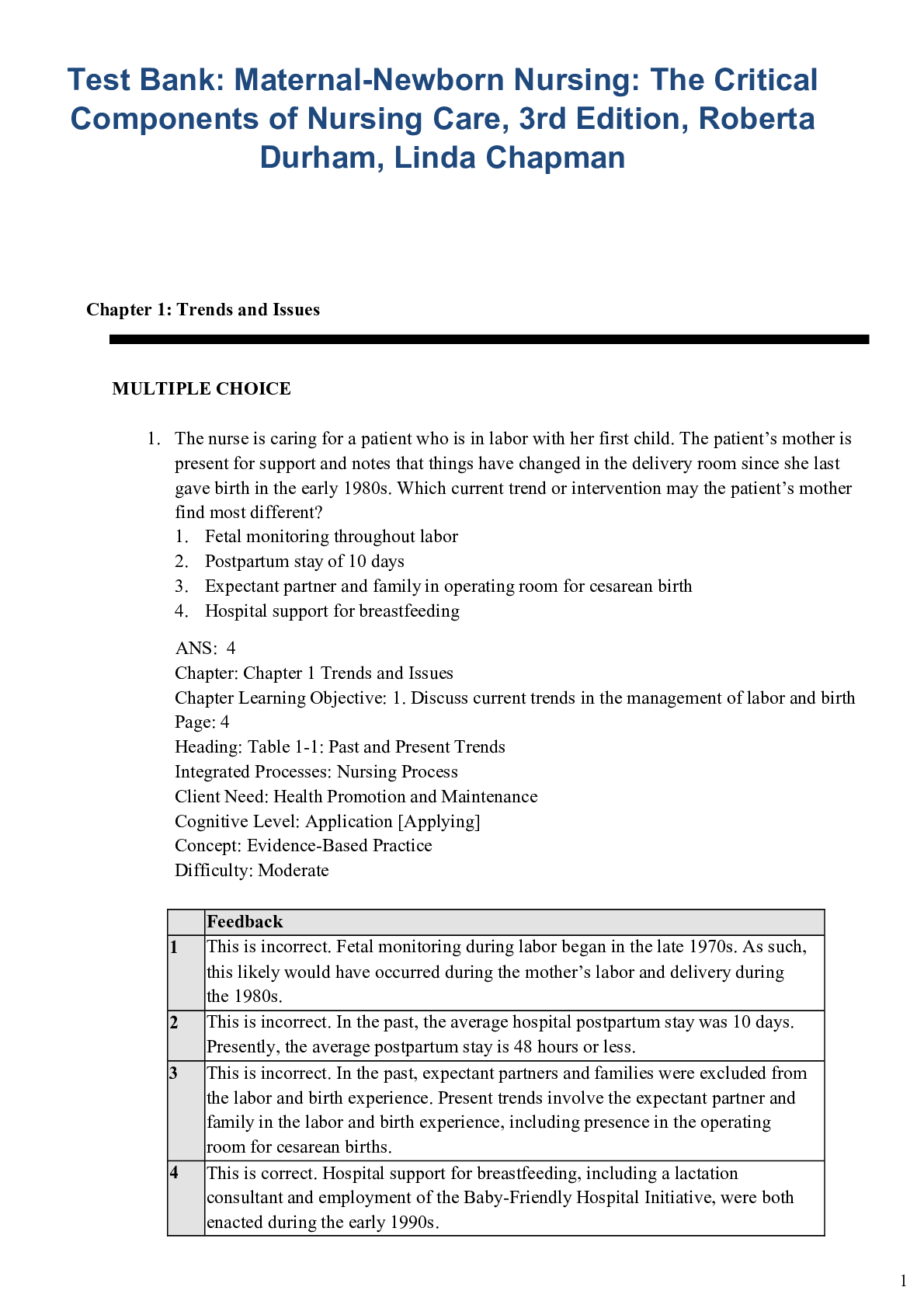1. The nurse is caring for a patient who is in labor with her first child. The patient’s mother is present for support and notes that things have changed in the delivery room since she last gave birth in the early 1980s. Which current trend or intervention may the patient’s mother find most different?
1. Fetal monitoring throughout labor
2. Postpartum stay of 10 days
3. Expectant partner and family in operating room for cesarean birth
4. Hospital support for breastfeeding
A patient with a history of hypertension is giving birth. During delivery, the staff was not able to stabilize the patient’s blood pressure. As a result, the patient died shortly after delivery. This is an example of what type of death?
1. Early maternal death
2. Late maternal death
The nurse is providing education to a patient who has given birth to her first child and is being discharged home. The patient expressed concern regarding infant mortality and sudden infant death syndrome (SIDS). The patient had an uncomplicated pregnancy, labor, and vaginal delivery. She has a body mass index of 25 and has no other health conditions. The infant is healthy and was delivered full-term. What will be most helpful thing to explain to the patient?
1. Uses of extracorporeal membrane oxygenation therapy (ECMO) 2. Uses of exogenous pulmonary surfactant
3. The Baby-Friendly Hospital Initiative
4. The Safe to Sleep campaign
4. The nurse is caring for a 14-year-old patient who is 32 weeks pregnant. After complaining of genital sores and discomfort, the patient tests positive for syphilis. The fetus is at increased risk of which condition?
1. Diabetes
2. Blindness
3. Pneumonia 4. Hypertension
The nurse is caring for a 15-year-old female who is pregnant with her first child. In her previous prenatal visit, the patient tested negative for chlamydia, syphilis, gonorrhea, and HIV. Based on the information provided, which condition is the patient’s baby at higher risk for?
1. Intestinal problems
2. Neonatal conjunctivitis
3. Blindness
The nurse is caring for a 23-year-old patient who arrives at the clinic for a pregnancy test. The test confirms the patient is pregnant. The patient states, ―I do not need to stop smoking my electronic cigarette because it will not harm my baby.‖ Which is the best response by the nurse?
1. ―You are correct. Electronic cigarettes are not harmful during pregnancy.‖
2. ―Tobacco products, including electronic cigarettes, should not be used during
pregnancy due to risking nicotine toxicity.‖
3. ―According to the FDA, although electronic cigarettes are safe for you, they can
cause harm to the fetus during pregnancy.‖
4. ―Electronic cigarettes are considered harmful only in the first trimester.‖
The nurse is caring for a 16-year-old patient who is 32 weeks pregnant with her first child, who is male. The patient’s mother has accompanied her to today’s visit. During the nursing assessment, the patient mentions that she is no longer in a relationship with the baby’s father but her mother plans to help her. However, the patient’s mother asks whether this will have any impact on the child. Which should the nurse indicate the child is at increased risk of during his adolescence?
1. Hypertension 2. Diabetes
3. Alcohol abuse
4. Intraventricular bleeding
ANS: 3
The nurse is caring for a patient at 7 weeks gestation. The nurse suspects that a pregnant patient may have been using marijuana. With consent, the nurse confirms via urine drug screen. Which statement by the nurse is most appropriate?
1. ―Did you smoke marijuana when pregnant with your other child?‖
2. ―To avoid negative effects on your baby, you’ll need to stop using marijuana during your last trimester.‖
3. ―Using marijuana while pregnant can have a negative effect on the neurological
development of your baby.‖
4. ―Marijuana use while pregnant greatly increases your risk of miscarriage.‖
ANS: 3
The nurse is counseling a female patient about alcohol use during pregnancy. Which statement by the patient demonstrates successful patient teaching?
1. ―I will limit my drinking to just one alcoholic beverage per day.‖
2. ―It’s best for my baby if I avoid drinking during pregnancy.‖
3. ―An occasional drink on special occasions is okay.‖
4. ―Drinking alcohol is only acceptable in the first trimester.‖
ANS: 2
Read More

